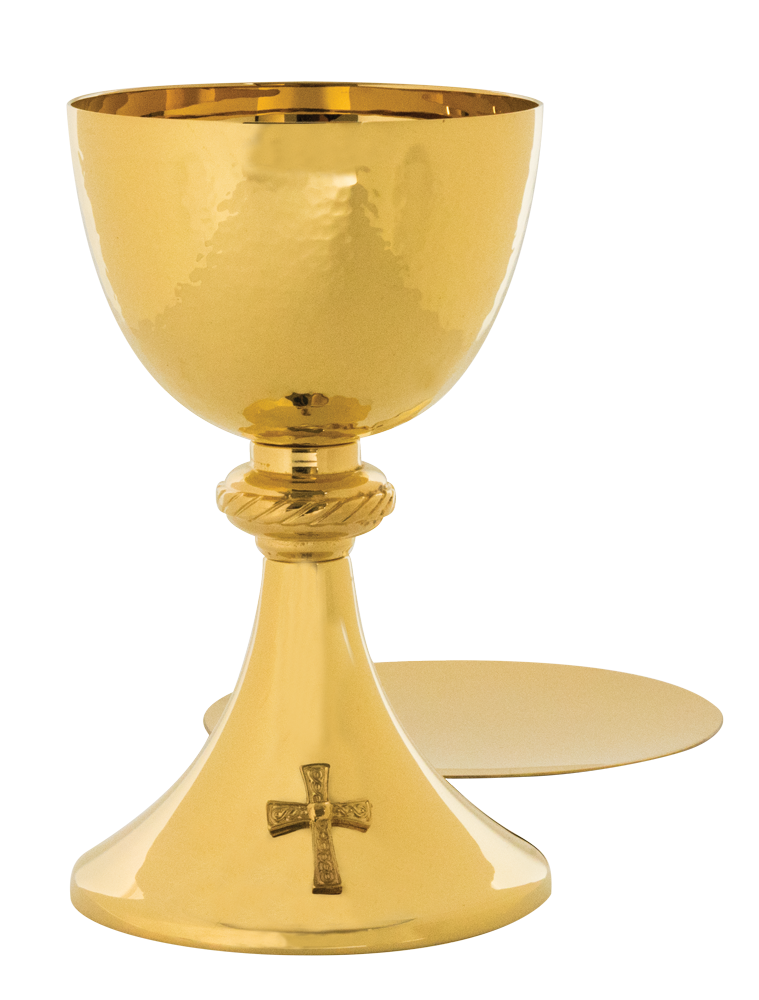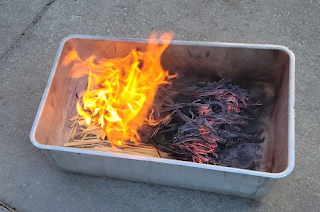Maundy Thursday in the time of COVID
I received from
the Lord what I also handed on to you, that the Lord Jesus on the night when he
was betrayed took a loaf of bread, and when he had given thanks, he broke it
and said, "This is my body that is for you. Do this in remembrance of me"
(1 Corinthians 11:23-24).
“I received from the Lord what I also handed
on to you,” Paul tells the Corinthians. Jesus
said, “Do this in remembrance of
me.” We typically think of remembering as the mental equivalent of looking at
an old photograph—the dusting off of facts and experiences from the past,
bringing some encapsulated historical bits out of their filing cabinet or
museum case, out of the forgotten archives, into the present for a few brief
moments of reflection. But this is not the kind of remembering that Paul is
talking about; this is not “biblical” remembering, not “biblical” memory.
You all know that well-worn soap
opera plot device that uses amnesia—where someone gets hit on the head
and can’t remember who they are? These people suffering from amnesia are not
themselves; they are lost, confused, lonely, fearful…Then, when their amnesia
is cured, they are once again able to be who they really are—they are themselves
again. When Paul says, “Do this in remembrance of me,” the word he uses is anamnesis—literally,
“un-amnesia.” What we’re doing when we celebrate the Eucharist, Paul says, is
not simply recalling what Jesus happened to say that Maundy Thursday night in
the Upper Room—it is a life-changing, identity-restoring action. We are re-membering
our selves: all the king’s horses and all the king's men couldn’t put Humpty
Dumpty back together again—and neither can we ourselves—but Jesus can
and Jesus does. Paul says that when we welcome the presence of the living Jesus
into our lives, our amnesia is cured; we are no longer lost, no longer confused, no longer lonely,
no longer fearful. We can know and become who we truly are: the redeemed, the
beloved, the children of God.
These are difficult readings for a
strange and hard night, a night when we read of the very first Eucharist in a
time when we ourselves cannot participate in communion, when we have gone so many weeks without
sharing the holy bread of Christ’s Body and the holy wine of His Blood. On this
strange and hard night, we will not be saying these words of Institution—we
won’t be using that part of our liturgical prayers are actually officially called the Anamnesis…our affirmation of re-membering and assimilating Jesus’ real presence
into our lives. Maundy Thursday in isolation seems to almost be a cruel mockery
of itself. How can we make sense of it?
Rev. Andrea Roske-Metcalfe, an ELCA
pastor, has written this, “A Poem for Maundy Thursday in Isolation,” and it’s
helped me find comfort in this strange and hard night—a night that was, surely,
strange and hard for Jesus, as he lovingly broke bread with and blessed the friends
he knew would, in a few hours, abandon him.
A Poem for Maunday Thursday, by Rev. Andrea Roske-Metcalfe
On the night in which he was betrayed
(that is to say, the night before he was killed;
the night when his friends gave him up,
gave him over to their greed and their fear,
which they regretted almost immediately,
but even almost immediately turned out to be already too late),
(that is to say, the night before he was killed;
the night when his friends gave him up,
gave him over to their greed and their fear,
which they regretted almost immediately,
but even almost immediately turned out to be already too late),
On that night, he sat around the dinner table with his friends.
Things were dicey, even if no one said it out loud.
Some of them couldn’t sleep,
and some of them slept all the time,
and all of their thinking felt fuzzy.
The men in charge, in other, more important places,
couldn’t get their stories straight.
The body count kept rising.
No one knew what would happen in the end,
but it was clear that things would get much worse
before they even began to get better.
Things were dicey, even if no one said it out loud.
Some of them couldn’t sleep,
and some of them slept all the time,
and all of their thinking felt fuzzy.
The men in charge, in other, more important places,
couldn’t get their stories straight.
The body count kept rising.
No one knew what would happen in the end,
but it was clear that things would get much worse
before they even began to get better.
On that night, the meal was plain, and simple, and confusing, even.
(Most of the usual stuff was all out at the grocery store, and anyway, the Instacart delivery wouldn’t arrive for another 3 days.)
(Most of the usual stuff was all out at the grocery store, and anyway, the Instacart delivery wouldn’t arrive for another 3 days.)
On that night, he took those pre-packaged sandwich crackers
(the bright orange kind with peanut butter in the middle),
and he gave thanks and he shared them around the table and he said,
“Take and eat. This is my body, given for you,
to remind you that nourishment takes on so many forms;
to remind you that nourishment will look differently now,
for a while; maybe even for forever,
but this body is enough and you are enough and we are enough.
Eat these, together, and remember me.”
(the bright orange kind with peanut butter in the middle),
and he gave thanks and he shared them around the table and he said,
“Take and eat. This is my body, given for you,
to remind you that nourishment takes on so many forms;
to remind you that nourishment will look differently now,
for a while; maybe even for forever,
but this body is enough and you are enough and we are enough.
Eat these, together, and remember me.”
In the same way, after that strange supper,
he took cranberry juice cocktail.
(The wine had run out days before and anyway,
this was the same color, with added vitamin C.)
He poured it – into champagne flutes and water bottles
and shot glasses and sippy cups –
and he gave thanks.
he took cranberry juice cocktail.
(The wine had run out days before and anyway,
this was the same color, with added vitamin C.)
He poured it – into champagne flutes and water bottles
and shot glasses and sippy cups –
and he gave thanks.
He said, “This cup is the new covenant in my blood,
poured out for you and for all people –
(listen up: for ALL people) –
for the forgiveness of sins.
This cup is poured out to remind you to look for community
in new and unexpected ways;
to remind you to be community for others in new and unexpected ways,
because this cup is enough and you are enough and we are enough.
Drink this, together, and remember me.”
poured out for you and for all people –
(listen up: for ALL people) –
for the forgiveness of sins.
This cup is poured out to remind you to look for community
in new and unexpected ways;
to remind you to be community for others in new and unexpected ways,
because this cup is enough and you are enough and we are enough.
Drink this, together, and remember me.”
And they did.
That strange and confusing meal was all they had,
but that night, it was enough.
but that night, it was enough.
And they were scared,
whether they said it out loud or not,
but they were together (in one way or another),
and that was enough.
whether they said it out loud or not,
but they were together (in one way or another),
and that was enough.
And together,
that night,
they were enough.
that night,
they were enough.
St. Paul, in another letter, one to
the Romans, assures us that neither death, nor life, nor angels, nor rulers,
nor things present, nor things to come, nor powers, nor height, nor depth, nor
anything else in all creation, will be able to separate us from the love of God
in Christ Jesus our Lord. Nothing is able to separate us from God’s love. The
Book of Common Prayer, on page 457, says that if one is unable to actually
consume the consecrated Eucharistic bread and wine due to extreme sickness or
disability, the desire is enough for God to grant all the benefits of
communion. When being present at a celebration of the Eucharist is absolutely
impossible, prayer and meditation can provide the means by which we can open
ourselves to Jesus’ presence and to God’s grace and blessing. My prayer for you
is that you will pray for Jesus to come into your heart; pray to unite yourself
with Him and offer praise and thanksgiving for life’s blessings and for His
precious passion, death, and resurrection. My prayer is that as you do you
will be united with Jesus and know His real, active, living presence in your
heart and in your life; that you will share Jesus’ passion for justice and
mercy; that you will see with Jesus’ eyes of love and compassion; that you will
serve with Jesus’ selfless and sacrificial strength. My prayer is that through
Jesus’ presence we will all, each of us, be re-membered—be put back together as
our true selves, the members of Jesus’ body here and now, as we wait to be
re-membered all together in praise and worship at the end of this pandemic’s
journey—For nothing—nothingؙ—is able to separate us from the
live-changing presence and love of Jesus our Savior. Nothing. Amen.





Comments
Post a Comment